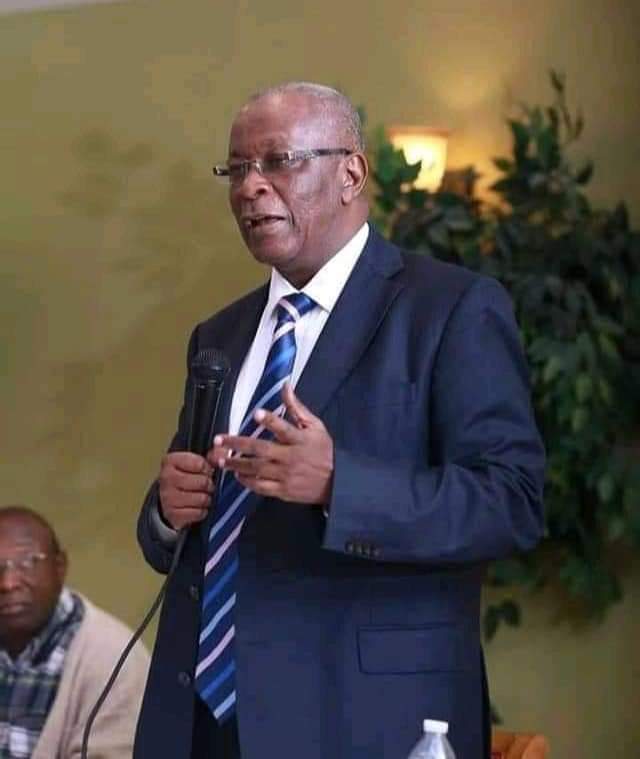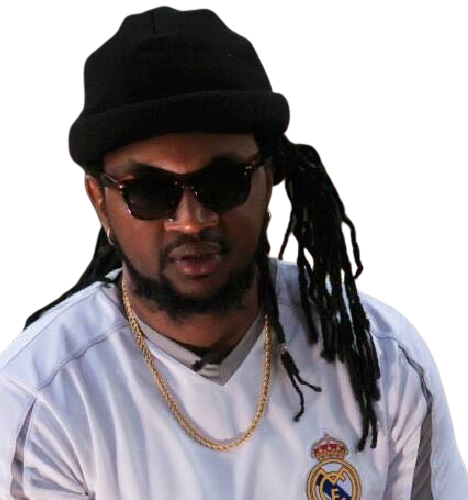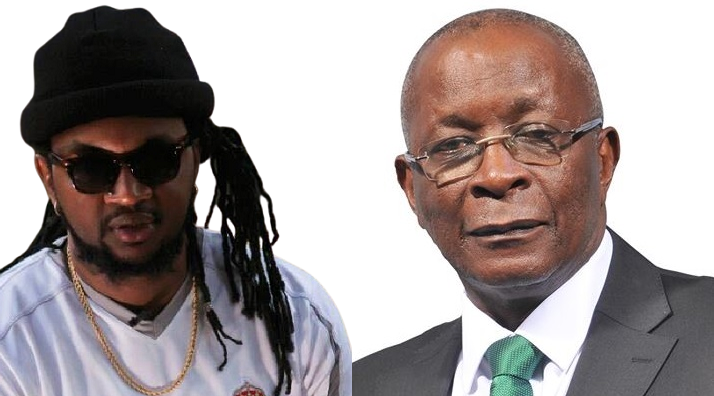After putting him to sleep on her lap, she called for someone to shave off the seven braids of his hair, and so began to subdue him. And his strength left him. Judges 16:19
Never in the field of Sierra Leonean history has a simple haircut caused so much brouhaha. Just when we thought the fake degree issue would still be on our front pages, the Police decided it was time to change the narrative. They got hold of Alhaji Amadu Bah aka LAJ, a famous (some would say infamous) musician, incarcerated him at Benghazi Camp and forcefully cut off his long hair, leaving him with what a fellow artist calls a “tollone pepper”. Human rights activists and other members of the public have criticised the excesses of the Police for trampling on LAJ’s human rights. There are others who have no sympathy for LAJ. They say he is a social misfit, jumping from one problem to another and had in fact beaten up and robbed a petrol station attendant. According to them he deserved to be humiliated and should probably be locked up and have the key thrown away.
Whatever the case, LAJ’s treatment has once again put the spotlight on the excesses of the Police. As with other similar episodes of high handedness, the Police response can only be described as being like a tragicomedy. First it was the Police denial that accusations that LAJ had been poisoned and had his hair shaved were true. They easily shrugged off the former accusation but after some initial denial later admitted to the latter and stoutly defended their action. The Police claimed it was part of their Standard Operating Procedures (SOP) for Benghazi to have the hair of detainees shaved. With observations from critics that other detainees had not had their hair shaved off, they further refined the excuse. This time according to the Inspector General of Police (IGP) himself on BBC radio, it was to prevent LAJ from hanging himself. How considerate!
Let us step back and take a look at a few of the reasons a Senior Police Officer (Superintendent Lielondo) gave me as justification for the haircut:
They had heard that LAJ had supernatural strength that was derived, like Samson from his long hair and cutting the hair would weaken him.
Some senior officer mixed up LAJ with LAC and thought they had finally caught the fugitive who has become a pastor of sorts, doling out money like a drunken sailor. They had the same long hair-only that this one does not preach-he cusses!
Benghazi is actually a Libyan enclave within Sierra Leone and has diplomatic status.
The Police wanted to show they are better barbers than Blacka.
The saying “Kill dog befoe dog mek dog know say die day” is the motto of the Benghazi squad.

Nota bene: A disclaimer is hereby issued just in case someone has the wise idea to take me to Benghazi-Superintendent Lielondo is a figment of this writer’s imagination!
Now let us for one moment compare LAJ to Samson and the Police to Delilah. In some ways LAJ is not like Samson-Unlike LAJ, Samson was said to be good-natured, sarcastic, full of humour and fought with his wits as well as with his fists. Among his character flaws was a fondness for Philistine women. One was named Delilah. The Police bear some similarity to Delilah. As Samson slept, Delilah cut his hair and called in the Philistines who captured Samson. They barged in, gouged his eyes out, and took him to prison in Gaza (still dogged by trouble, just like Benghazi!). The Police will not go that far! All they have done is give him a “tollon pepper”. Even in incarceration as Samson’s hair began to grow back, he used all of his might and pushed down the temple, killing himself and thousands of Philistines and rulers. LAJ’s hair is unlikely to grow that fast and he is unlikely to pull down Benghazi (E nor crase!).
It is really unfortunate that the Sierra Leone Police (SLP), an institution for which Sierra Leoneans held out so much hope has for some time now become a source of parody.
Remember the time IG Manu banned jogging? The Police press release referred to “the habit of jogging in large numbers along the streets with a hint of menace, raining insults, obstructing traffic, pounding on vehicles, playing loud music, and snatching property from other members of the public”. Many stated that his real motive was to muzzle political dissent as political flagbearer aspirants included jogging of supporters into their campaign arsenal and groups of youths had started chanting anti-government songs. Deputy Information Minister at that time, Cornelius Deveaux, when put on the ropes defended the ban, saying that obtaining Police permission could in fact enable ambulances to be provided for joggers that may collapse whilst running! What a compassionate government! Anyway an interesting postscript is that Deveaux himself (now a severe police critic) is now in self-exile, having succeeded as an Olympic high jumper and sprinter in scaling a high fence and dashing with speed to make his escape when the “friendly” Police chased him.

Alliance Democratic Party leader, Mohamed Kamaraimba Mansaray was accused of having a stun gun to allay attacks on him for which he received no help from the Police. The stun gun was deemed an offensive weapon. The statement in Segbwema Magistrate court by the Ghana trained “Ballistic expert” attached to the Forensic unit of the Police is legion:
“The Zap enforcer has three buttons. The first button serves as the switch to put the zap enforcer on, the middle button is responsible for controlling the lightning system which produces high and slow strobe lights and, the third button produces a sound to tell you that it was working and producing current.”
The Magistrate should simply have read the manual!
Remember Dr. Sylvia Blyden’s arrest for displaying a picture of President Koroma in her house? Our “boys in blue” dutifully impounded the picture as evidence (OMG, evidence of what?).
The SSD wing of the Police (originally Internal Security Unit, ISU) who mainly comprise the Benghazi squad have a colourful history. It was a paramilitary wing of the SLP most of whose members received training in communist China and Russia and became an instrument of power, at the sole disposal of the president and his party. In 1999 President Kabbah embarked upon reforming the Police and brought in an ex British Policeman Keith Biddle as the IGP. Between 1999 and 2003, Biddle initiated an aggressive restructuring process that transformed the SLP into a “force for good”. New Departments were added, the organisational hierarchy made leaner and issues like gender mainstreaming and Local Needs policing incorporated. The Independent Police Complaints Board (IPCB) was also established in 2014 to receive, investigate and monitor complaints from the community about the SLP, to protect people from abusive police practices, and to enable public accountability for misconduct and human rights violations.
These changes initially took root and remained intact after Keith Biddle left but steadily started declining as Politics intruded into Police work. More recently mistrust of the Police has been rife. Human rights abuses by the Police have been much too commonplace and many of these have fallen right at the door of the SSD.
Many groups are rightly calling the SOP illegal and nonsensical and not in line with Human Rights requirements. They are also rightly calling hat Hfor LAJ to have access to his lawyers. As someone asked, where will this all end? What if the Police decide that those with a long beard should be shaved as they could inflame their beard in a fire?
There is talk that LAJ has knocked Dr. Idriss Lahai, champion of the fake degree issue off the front pages. Well, not quite! Dr. Lahai has joined some artists to also shave off his hair in solidarity with LAJ. He has additionally formed “Operation knack Sovula” against forgery with the objective of portraying IGP Sovula as a degree cheat to his colleagues on the continent. The IGP himself has been made a source of parody in social media postings.
Distrust of the Police is now a very serious issue that should be addressed by government. It is obvious that a careful balance has to be struck between legitimate ‘supervision’ of the police by the political executive and illegitimate interference and influence. Conversely, the police must always remain accountable to elected politicians for enforcing the law and to perform its duties in accordance with the law.
We must as a nation guard against the inordinate politicisation of our Police. It is obvious that appointing a highly qualified, experienced and respected IGP will help immensely. One solution also suggested is that the IGP must be given suitable protection against arbitrary removal (i.e. removal should not be permitted unless there is evidence of is conduct/incapacity or until after the expiration of a fixed term). The basic truth is that for policing to transform, it is necessary for the government – to whose authority police are subject to, itself be committed to democratic norms and checks and balances, and importantly see the police as an instrument for protecting the safety and democratic rights of the people.
This LAJ issue is not just about LAJ. It is not about hair and Samson and Delilah. It is about the Police.
Ponder my thoughts.











